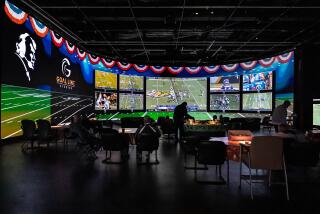In Their Faces : Old-Timers Remain Locked Out of Modern NFL Riches
- Share via
Big Ed Ecker of the Akron Bears powered his way through the offensive line and found himself in the backfield of the Bethlehem Bulldogs. Just him and the Bulldog punter. Ecker raised his arms to block the punt, and he did, indeed, block the punt. His arms, however, were not involved.
Had the play occurred in 1950, the memory of it likely would have long since faded from Ecker’s mind. Because in 1950, Ecker was wearing a thing called a face mask on his football helmet. Unfortunately for him, the blocked punt against the Bulldogs came in 1946. And at that time, football players had no face masks. But they did have faces. And a second after the two-pound leather football boomed off the kicker’s foot, its forward progress was abruptly halted by the face that belonged to Ecker.
The collision of football and face caused the ball to ricochet nearly 50 yards, back to the Bulldogs’ end zone.
“It damn near knocked me out,” Ecker recalled from his home in Sherman Oaks. “There were tears pouring out of my eyes from the force of the blow. I finally got my eyes opened and realized I was all alone. Everyone else was at the other end of the field, trying to find the ball. I got to my feet and staggered off the field, real woozy, and the coach comes up to me all smiling and happy because we recovered the ball and he says to me, ‘Kinda’ shook you up, didn’t it?’ and he laughed. No big deal.
“That’s how the game was played then.”
As the New York Giants and Denver Broncos were putting the final touches on their preparations for Super Bowl XXI on Sunday in Pasadena--for which scalpers are getting as much as $1,200 for a ticket--Al Wistert of Thousand Oaks, another warrior from the pre-face mask era, recalled how the players were paid then. Back when NFL championship games were not identified by Roman numerals and for $1,200 you could buy a ticket to the game and the quarterback’s car.
In nine seasons in the National Football League, Wistert earned a total of $73,000. That included bonus pay from being on two of the Philadelphia Eagles’ NFL championship teams. It did not, of course, include the wonderful gift he and his Eagles teammates received from the team’s grateful owner after their 14-0 victory over the Rams for the 1949 NFL title.
“After the game we went back to the Bel-Air Hotel and had a big banquet,” Wistert said. “And as a present, each of us received a Zippo cigarette lighter. I think they were worth about a buck and quarter each. I never even took mine. I left it on the table. Who the hell wanted a cigarette lighter?”
By the way, guess who paid for the rooms at the Bel-Air Hotel? Yes, sir, the players themselves. But hey, they could afford it. Most of them made $3,000 or $4,000 a year. Some of them made $6,000 a year. And if that doesn’t sound like a lot of money in 1987 . . . well, it didn’t sound like a lot of money in 1949, either.
“I look at these guys today and I just have to laugh,” said Wistert. “The winner of Sunday’s Super Bowl will get about $75,000 or $85,000 per man, just from the playoffs and Super Bowl. That’s what I made in my whole career. From 1943 to 1951. Playing offense and defense.”
Walter (Piggy) Barnes of Burbank, a teammate of Wistert’s on the Eagles in both NFL championship seasons, looks at it this way: “A good offensive or defensive lineman in the NFL today could have afforded, on just one season’s salary, to buy the 1948 Eagles, the NFL championship team. The whole team sold for $250,000 in 1949.”
The average NFL salary in 1986 was more than $200,000.
Ecker, Wistert and Barnes are among about 420 NFL veterans known as the pre-59ers, men who built the NFL by toiling on bad fields in bad weather with primitive equipment for very little money, and have been rewarded for their sacrifices by being denied any of the NFL’s pension funds.
The current agreement between the NFL team owners and the National Football League Players Assn. has a three-tiered pension structure. Those who played between 1972 and the present get the most money. Those who played between 1959 and 1972 get some money. Those who retired before 1959 get no money. Somewhat amazingly, 61 of the 133 members of the Pro Football Hall of Fame have not received a dime in NFL pension funds. That list includes Otto Graham, Tom Fears, Elroy Hirsch, Sid Luckman, Dick (Night Train) Lane, Marion Motley and others considered among the greatest ever to have played the game.
In every negotiating session between owners and the players association since the mid 1970s, the union has asked the owners to consider a pension plan for the pre-59ers. The owners have turned their backs on all such requests, and for many of the more than 400 pre-59ers who are still very much alive, that rejection hurts more than blocking a punt with their naked faces.
“It’s one of the saddest situations in sports,” Ecker said. “The guys who could use the pension money the most get nothing.”
Said Wistert: “The owners won’t even put us on the agenda. They won’t even discuss it. It’s non-negotiable.”
But a change in that situation might be near. In 1985, according to the players union, 82.5% of the players voted that the pre-59ers deserve a pension. In 1986, the Board of Player Representatives voted 28-0 to include a pension for the pre-59ers as one of their top three priorities this year, when negotiations for a new contract begin.
In a memo he sent last December to his former Eagles teammates, Wistert wrote: “Things are getting more interesting for us pre-59ers as to the possibility of receiving some sort of income from the NFL Players Pension. Just be sure your dues are paid to the NFL Alumni and pray a lot and we may get something after all.”
Ecker is 64. Wistert is 66. Barnes, now an actor who has played major roles in three Clint Eastwood films, is 68. Last year, one of the greatest of all the pre-face mask players, Bobby Layne, died. He was 59. The remaining pre-59ers know that the clock is running. As the three NFL veterans sat in Ecker’s living room, Ecker mentioned that another of their colleagues had passed away in 1986.
“We’ll all pass away before we get our pensions,” Barnes said. “I think that’s what the owners want.”
More to Read
Go beyond the scoreboard
Get the latest on L.A.'s teams in the daily Sports Report newsletter.
You may occasionally receive promotional content from the Los Angeles Times.










